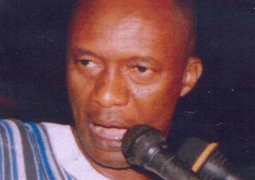We serve an all-knowing, ever-present and all–powerful God, - One without comparison. Nothing is hidden from him; he knows, sees and hears everything instantaneously. He is an awesome God who is able to do any and everything. And yet he would ask questions of us that would require answers. One is prone to wonder why would a sovereign God want to probe something that he already has an answer to? Besides, what kinds of questions would he want to ask us in the first instance? Well, the fact of the matter is that he did ask some questions and elicited some answers from his subjects. Let's look at a few.
It was not unusual for God to visit Adam and Eve in the Garden of Eden in the evenings for a chat. One evening as he walked the Garden he could not find them at their usual meeting point. What actually happened was that "the man and his wife heard the sound of the Lord God as he was walking in the garden in the cool of the day (evening) and they hid from the Lord God among the trees of the garden." (Genesis 3:8) Naturally, since they could not be found, God called out to Adam "Where are you?" (Genesis 3:9)
So it will be when God is looking out for us where we ought to be and we seem invisible that he would like to know where we are and what is preventing us from being there with him. He would demand an answer because we had made it a habit of meeting with him there. That we are not there when he turns up is of concern to him - the reason why he would press further for answers.
Adam's answer was revealing. He said: "I heard you in the garden, and I was afraid because I was naked; so I hid." (Genesis 3:10) Hiding is one of the primary reactions of human beings after they have offended or disobeyed God. We cannot look at him in the face again. Just as we cannot look at our parents in the face when we are caught red-handed or confronted with our evil deeds, Adam and Eve had to hide. No sooner the guilt feeling hits our conscience than we want to disappear and melt into thin air. Isn't that a trait we inherited from our great, great ancestors?
The enquiry continued as God asked the second question. "Who told you that you were naked? Have you eaten from the tree that I commanded you not to eat from?" (Genesis 3:11) God had given clear-cut instructions that no one should eat of the tree in the centre of the garden. "You are free to eat from any tree in the garden, but you must not eat from the tree of the knowledge of good and evil, for when you eat of it you will surely die." (Genesis 2:16-17) The instruction was straight forward enough. Eve even repeated it to the serpent that tempted her. "We may eat fruit from the trees in the garden, but God did say, 'You must not eat fruit from the tree that is in the middle of the garden, and you must not touch it, or you will die." (Genesis 3:2-3) Sin therefore brought separation between God and his creation–Adam and Eve. Their relationship was severed because they had decided not only to touch but to eat of the fruit God had forbidden them to. By doing so they had disobeyed God. Relations became strained and the couple was driven out of the garden to start a new life from scratch.
That led to the third question addressed to Eve after her husband squarely laid the blame on her. "The woman you put here with me - she gave me some fruit from the tree, and I ate it." (Genesis 3:12) The third question was "What is this you have done?" (Genesis 3.13) In other words 'why did you have to do this?' The woman answered and said: "The serpent deceived me, and I ate." (Genesis 3:13) Then the axe fell and God cursed the serpent, the woman and Adam for what transpired.
Since the time of Adam and Eve, human beings have been misled by the craftiness of Satan disguised here as a serpent. Indeed, he has taken many forms in our day to break up the fellowship with our God. His sole purpose is to separate us from our Maker for good. His lies and his deceitfulness to which we fall prey so easily succeed only in distancing us from our God. Why listen to him when his motive is to kill, steal and destroy. (John 10:10) Who has the truth? Who has the final say?
God asked Cain a question with regard to the whereabouts of his brother Abel. "Where is Abel your brother?" (Genesis 4:9) This would look like a normal question to ask if God needed Abel and could not find him. But there was more to it than meets the eye. Cain had in a fit of jealousy murdered his brother, Abel. He felt this hideous act would go unnoticed and could never be uncovered. God, who has eyes everywhere, witnessed the deed and questioned Cain. His answer was not guiltless. He replied: "I don't know. Am I my brother's keeper?" (Genesis 4:9)
God expects us to worry about the welfare of our kith and kin, to show some concern about their well-being. We are social beings and no one is an island. We are accountable to God for our brothers and sisters in the widest sense. How do we answer? Destroying them where we are supposed to protect them would not be the answer.
God asked one of the great prophets of the Old Testament this question. "What are you doing here, Elijah?" (1 Kings 19:9) Straight away the question would tell you that Elijah was not where God expected him to be. Elijah had won a stiff encounter against the prophets of Baal and had killed over 450 of them with his sword. What a feat! However when Jezebel heard from the lips of her husband Ahab what happened, she sent a messenger to tell Elijah. "May the gods deal with me, be it ever so severely, if by this time tomorrow I do not make your life like that of one of them." (1 Kings 19:2)
Queen Jezebel had earned the reputation of not mincing her words and had been acclaimed as the most wicked person ever. The prophet therefore was afraid and he fled for his life. He would not put up a fight. (1 Kings 19:3) To the question, "What are you doing here?" Elijah answered: "I have been very zealous for the Lord God Almighty. The Israelites have rejected your covenant, broken down your altars, and put your prophets to death with the sword. I am the only one left, and now they are trying to kill me too." (1 Kings 19:10) Should the prophet Elijah have been speaking in these terms? Does his comportment honour God the Almighty? Should he have run away?
When we behave like chickens before our adversaries we discredit the God of Abraham, Isaac and Jacob - the Lord God Almighty. It is he who is behind so many marvels in our lives. "Is anything too hard for the Lord?" (Genesis 18:14)
Read Other Articles In Article (Archive)




